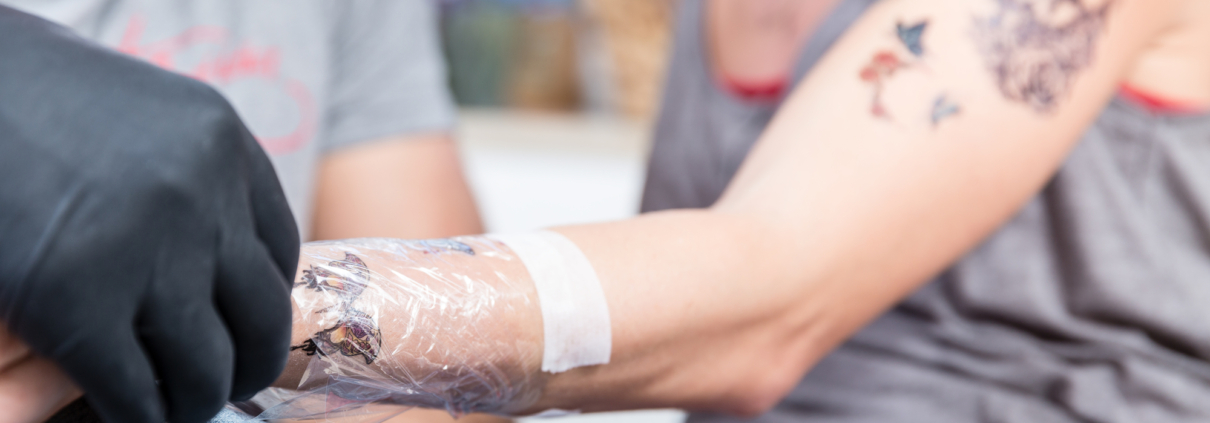How to Prevent a Tattoo from Fading
In many cases, fading is one of the signs of a poorly done tattoo. That being said, even the best of tattoos can fade over time. The degree of this problem will vary a lot because many factors can play a role. The location of the tattoo, the type of ink used, the type of needle/gun used, and the health of the skin itself are all key to the longevity of a tattoo. It all comes down to one point: Some tattoos will age better than others, but there are things you can do to help make sure that yours will last as long as possible.
View this post on Instagram
Why Do Tattoos Fade?
The first step is to understand why some tattoos will fade with time. The most common reason is artist error. If a tattoo is done by amateur hands, it will not have the consistency of a professional’s work. Thus, certain parts might fade while others do not. It is important that the ink is placed deep enough in the skin, and amateur artists often fail to do that.
The use of poor-quality ink (or worse, improvised ink) will also make fading a lot more likely. This is why jailhouse tattoos don’t tend to last, incidentally. Changes in skin health, including various skin infections, can also damage a tattoo. Too much exposure to sunlight, especially within the first few weeks, is another critical thing to avoid. Finally, it is generally agreed that smoking is bad for a tattoo because it causes dehydration. When the body is dehydrated, the skin is one of the first organs to feel the effects.
Tip #1: Treat A New Tattoo Like A Newborn Baby
It seems that the first three to four weeks are very important in regards to the prevention of fading. You see, it takes a little while for that ink to seep all the way into your skin. At the same time, the skin also needs time to. While most tattoos are considered to be healed within 3-4 weeks, it can take as long as 6 months before the tattoo takes its “final form.”
So, for those first 3-6 months, you need to treat that tattoo like a newborn baby made of glass. Avoid wearing tight clothing over that spot, and leave it uncovered as much as possible. Ideally, it should only be covered by loose clothing in order to protect it from direct sunlight. The hot summer sun, in particular, must be kept away from a new tattoo. Keep it clean, but use simple and non-scented soap products. As for the smoking thing, that’s an unhealthy habit anyway! If you cannot bring yourself to quit, we would suggest limiting consumption as much as possible and drinking plenty of water.
Tip #2: Increase Your Water Intake
As we have already explained, dehydration of the skin can happen easily. However, its effects are usually not drastic enough to be noticed. Still, even mild dehydration makes a difference in terms of skin health. When the body needs moisture for critical processes, it compensates by pulling that moisture from less critical processes like skin hydration.
Poor hydration also results in a decrease in blood volume. This is why dehydrated people will look “shrunken” after a certain point. The skin will have a lot more elasticity when proper blood flow is maintained. This study is one of those that have established a link between oral hydration and skin health. That’s why you should drink 11-16 cups of water per day until your tattoo is fully healed.
Consider A Moisturizer
Chugging water isn’t the only way to improve your skin hydration. You can take a more direct approach and apply a moisturizing product directly to the skin. If you choose this route, we would recommend that you be very careful about the products you use for this purpose. Many of them contain ingredients that can contaminate an open wound (and a new tattoo is, essentially, a bunch of tiny open wounds). For this reason, it is best to stick with something recommended by your tattoo artist.
You May Need To Use Sunscreen
Most of these preventive measures are pretty simple, and most of them are easy to implement. However, the need to avoid direct sun exposure can be a little bit problematic. You can’t very well stay indoors for 3-6 months, nor should you have to do so. Thus, those of you who live in warm and sunny areas will need to use sunscreen on your new ink until the healing process is 100% complete.
This study, conducted on a group of French Tattoo artists, gives you an idea of how much sunlight can affect a tattoo (even an old one). a little less than half of the artists in the study reported some degree of inflammation, with about a quarter of those problems having been triggered by sun exposure. Thus, we can see that this is probably not a problem for older inkwork.
You Can Always Get A Touch-up
In spite of your best efforts, your tattoo might still fade a little bit with time. When that does happen, it isn’t that big of a problem. You will simply need to see a good touch-up artist. Re-inking an old tattoo is generally quite a bit cheaper than getting a new one, and this shouldn’t have to be done more than once for the same tattoo. All Philadelphia tattoo shops offer this service, but not all of them are necessarily equal.
Conclusion
In the end, it’s all about extended aftercare. After 2-3 weeks, you don’t really “have” to do anything to your tattoos. That being said, extending the aftercare phase for 3-6 months will make a big difference in terms of your tattoo’s lifespan. If you failed to do this with your last piece of work, you might be asking: “How can I find the best local tattoo shops near me?” For the Philadelphia area, you can call Oracle Tattoo Gallery at (215) 638-1601.



